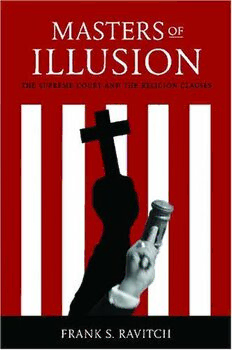
Masters of Illusion: The Supreme Court and the Religion Clauses PDF
255 Pages·2007·0.683 MB·English
Most books are stored in the elastic cloud where traffic is expensive. For this reason, we have a limit on daily download.
Preview Masters of Illusion: The Supreme Court and the Religion Clauses
Description:
Many legal theorists and judges agree on one major premise in the field of law and religion: that religion clause jurisprudence is in a state of disarray and has been for some time. In Masters of Illusion, Frank S. Ravitch provocatively contends that both hard originalism (a strict focus on the intent of the Framers) and neutrality are illusory in religion clause jurisprudence, the former because it cannot live up to its promise for either side in the debate and the latter because it is simply impossible in the religion clause context. Yet these two principles have been used in almost every Supreme Court decision addressing religion clause questions.Ravitch unpacks the various principles of religion clause interpretation, drawing on contemporary debates such as school prayer and displaying the Ten Commandments on courthouses, to demonstrate that the neutrality principle does not work in a pluralistic society. When defined by large, overarching principles of equality and liberty, neutrality fails to account for differences between groups and individuals. If, however, the Court drew on a variety of principles instead of a single notion of neutrality to decide whether or not laws facilitated or discouraged religious practices, the result could be a more equitable approach to religion clause cases.
See more
The list of books you might like
Most books are stored in the elastic cloud where traffic is expensive. For this reason, we have a limit on daily download.
